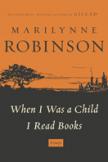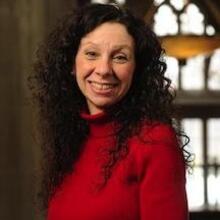Drop Everything and Read
Over the past thirty years, Marilynne Robinson has offered her readers powerful fiction and probing essays that explore the complexity of the human mind and the geography of the human heart. Readers of Housekeeping, Gilead, and Home, and of her essays (many of them collected in three previous volumes) have come to expect a blend of acute observation, deep learning, courageous assertion and compelling prose. Happily, Robinson’s new book of essays, When I Was a Child I Read Books, provides readers with all of this and more: a rare combination of wisdom and beauty that transforms our vision of our current cultural moment.
Robinson sounds her keynote early, as the preface calls upon Americans to attend to the voices of the past as a means of understanding, reimagining and reshaping the public discourse of the present. As such, it serves as a brilliant introduction to the 10 essays that follow, each of which engages this theme in various ways. The tutelary spirit of this volume of insightful meditations on the political, social, intellectual and spiritual life in these United States is the visionary poet Walt Whitman. Robinson quotes generously from Whitman’s “virtual hymn of praise to America,” Democratic Vistas, to demonstrate how far we have strayed from our democratic ideals. Despite Whitman’s warnings, we have chosen to pledge unholy allegiance to “savage, wolfish parties” who acknowledge “no law but their own will,” instead of thinking independently and holding ourselves steady “judge and master over them all.”
Consequently, Americans indulge themselves in fractious, partisan cacophony, the cure for which some leaders mistakenly believe is “the establishment of a kind of religious monoculture we have never had and our institutions have never encouraged.” To correct this wrongheaded urge, Robinson reminds us of how deeply America is rooted in the commitment to religious freedom and diversity, asserting that the only common articles of religion Americans have ever professed is belief in the sacredness of the human person and in the social value of the liberation of the individual. The erosion of public support of our institutions designed to promote the flourishing of the human—including our great public education system, our universities, our libraries and even our prisons—suggests that we no longer believe in the human person as the foundation of our nation and as the true source and repository of our wealth.
The reader might view this loss of faith in that old-time religion of the Sacred Self as counterintuitive, at first. An hour spent on Facebook, with its endless loop of self-promotion, self-aggrandizement and self-congratulation, would suggest that we live in an era of unprecedented devotion to the self. However, it is just this narcissism, wherein the beholder’s gaze is ever turned inward and fixed on his or her own private person, that has supplanted the outward-looking, other-centered love of The Self we see in our fellow human beings. Indeed, Whitman’s “Song of Myself” begins with what may seem to be the language of self-love, but the “I” of Whitman’s great poem quickly expands to encompass the reader, and the poem becomes a paean to the beauty and splendor of the universal “I” in all: “I celebrate myself and sing myself,/ And what I assume you shall assume,/ For every atom belonging to me as good belongs to you.”
Robinson’s preface is brief but characteristically dense and full of suggestion; it serves as a dynamo, powering the individual engines of the 10 pieces that follow. Most of Robinson’s essays begin by describing a private encounter with a writer or text—ranging from Edwards to Emerson, Aquinas to Skinner, Moses to Poe—and soon widen their focus to address a major theme relating to American democracy and, even more broadly, to Western Judeo-Christian culture. Like Whitman’s signature poem, which moves from the personal to the universal, each piece starts small but thinks big, grounding Robinson’s capacious thought in the reality of her lived experience as an American (her identity), as a writer (her vocation), as a teacher (her occupation) and, most important of all, as a reader. True to its title, this is a bookish book.
Each essay engages ideas that are both perennial and pertinent to our current cultural moment. In “Freedom of Thought,” Robinson considers our evolving understanding of the relationship between spirit and matter, delineating what science can teach us (the grand structure of the cosmos, the minute transactions of the nervous system) and what it cannot (the beauty, mystery and pathos of creation—the kinds of revelations conveyed to us through art, literature, music and religion). She reminds us of the essential fact in our secular, science-driven world: that “science can give us knowledge, but it cannot give us wisdom.” For this we look not to Darwin and Freud, but to the Wisdom tradition offered by Homer, Aeschylus, Virgil, Job and Jesus.
Rounding out the volume, Robinson returns to this theme in the final essay, “Cosmology.” Here she takes on neo-Darwinism and the new atheist science, both of whose discourses traffic in “certainty,” “a relic, an atavism, a husk we ought to have outgrown.” What none of our isms and ologies can explain is the absolute mystery of the human: “What are we, after all? Why are we such mysteries to ourselves? Why do we stand apart from nature, even to the extent of posing a mortal threat to its continued life?” These are questions no amount of science can help us answer. For these answers, Robinson looks to books.
In “Imagination and Community,” the volume’s strongest essay, Robinson reminds us that the role of the writer is “to make inroads on the vast terrain of what cannot be said.” This is a vocation she has prepared for in the course of a lifetime of reading: “The frontiers of the unsayable...have been opened for me by every book I have ever read that was in any degree ambitious, earnest or imaginative.” Robinson’s essays serve as both proof of this claim and as an invitation to us, as readers, to join the “community of the written word,” to travel side by side with her and the “cloud of witnesses” composed of the authors of books in her considerable library, and to thereby engage in “the broadest possible exercise of imagination.” It is this latter capability that has fueled the great social transformers of American society—including Jefferson, Lincoln and Martin Luther King Jr.—all readers who dared to imagine something that did not yet exist and to bring it into being. Robinson’s book urges Americans to stop our herding and our name-calling, to refuse to engage in wolfishness and blather and to nurture the radical power of the individual self through the agency of the word—in short, to drop everything and read.
This article also appeared in print, under the headline “Drop Everything and Read,” in the July 30, 2012, issue.








